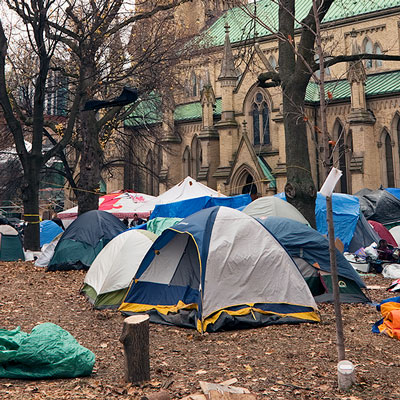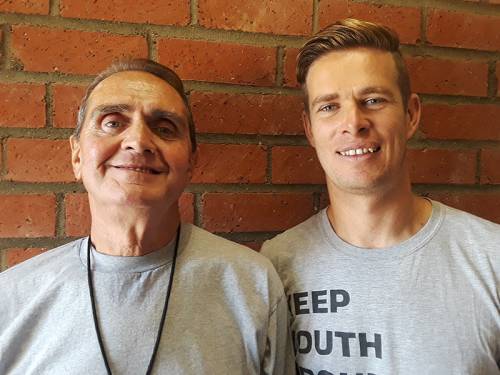Churches tire of quick fixes and seek solutions
January 14, 2019
Mark lived on the streets of Hollywood, well known by social service providers as one of the toughest homeless cases in the city. He was often found standing on a street corner, looking disheveled, staring into space. His looks scared most people away.
Mark arrived at First Presbyterian Church of Hollywood’s winter shelter program, called The Refuge, after a desperate referral from a social service provider. He arrived with a blank expression on his face and was unable to speak. Through tears and a warm embrace, Amie Quigley, director of urban outreach at First Presbyterian Church of Hollywood, mumbled to him, “God loves you and we love you too.” Mark was given a clean bed with a comforter and pillows in a quiet fellowship hall. Later, he sat down with several other guests to a warm meal served with love, laughter and kindness by church volunteers.
“Our mission at The Refuge is to care for our most vulnerable friends,” said Quigley.
Over time, Mark not only moved into permanent supportive housing and became stabilized on medication, he took his first Communion and was baptized at First Presbyterian Church of Hollywood. He is now involved in church activities and helping others.
 In partnership with the Los Angeles County Department of Mental Health, permanent supportive housing providers and the police department, The Refuge receives up to 25 homeless guests identified as gravely disabled each year. They are the most difficult cases to move into housing. During the winter, the guests gain strength, heal and connect with housing providers.
In partnership with the Los Angeles County Department of Mental Health, permanent supportive housing providers and the police department, The Refuge receives up to 25 homeless guests identified as gravely disabled each year. They are the most difficult cases to move into housing. During the winter, the guests gain strength, heal and connect with housing providers.
Now in its sixth year, The Refuge has become a model for how churches and agencies can partner to move people off the streets and into housing. When asked how the ministry works, Quigley said, “We love on them in the name of Jesus. We find that when you care for people well, we all share in the mutual blessing of healing.”
The ministry of The Refuge didn’t happen overnight, however. First Presbyterian Church of Hollywood has been a light to the city for decades, beginning with the Lord’s Lighthouse in the 1990s. The Lord’s Lighthouse continues serving lunch to a few hundred people after church each Sunday, sharing the gospel and building relationships, walking alongside their homeless guests with prayer, friendship and helpful resources. In 2003, First Hollywood added a weekday meal and program called the Hollywood Healthcare Partnership, bringing together the department of mental health and social service providers to more fully help homeless guests. The partnership has allowed the church to develop relationships with social service providers in the area to work together to move people into housing.

The Rev. Peter Dunn, right, co-pastor of St. Andrew’s Presbyterian Church, sees lives being changed by The Refuge, a ministry that not only provides a place to rest, but also seeks to secure permanent housing for those like Michael, pictured here. Courtesy of St. Andrew’s Presbyterian Church
St. Andrew’s Presbyterian Church in Redondo Beach, California, has also been serving hot lunches twice a week for more than 20 years and offering clothing, resources, a sermon and caring relationships with people experiencing homelessness. Over the past several years, St. Andrew’s has also been moving people into permanent supportive housing, in partnership with a social service provider.
Worship on a Sunday morning at St. Andrew’s now consists of praise reports of how many people have been housed, in addition to a list of current needs for the food ministry.
The Rev. Peter Dunn, co-pastor, also emphasizes the many discipleship opportunities in this ministry.
“Work with a youth to disciple them in this way; maybe they can become inspired to become a case manager for the homeless one day,” Dunn said.
With housing as the focus, churches are getting creative and considering the use of church parking lots and vacant property to build permanent supportive housing units. Others are considering opening their parking lots for campers. Churches with food ministries are learning how to offer more than a meal, and to connect people with local service providers and housing.
Dunn challenges the church to a deeper missional identity in Christ.
“Being missional isn’t just the next church trend to discuss in staff meetings,” he said. “It is learning the issues your city is faced with and saying how we can bring the light of Christ into that darkness.”
For people like Mark, that light is the light of life.
Rev. Heidi Worthen Gamble, Mission Catalyst, serving as the Hunger Action Advocate, Presbytery of the Pacific
Today’s Focus: Homelessness
Let us join in prayer for:
PC(USA) Agencies’ Staff
Jean Hemphill, BOP
Brian Henson, PMA
Let us pray:
God, we give you thanks. And we ask, Maker of words and wisdom, for a voice as well as the craft to piece together the vocabulary of your good news, so that even in our struggles we may find peace in the stories we make together. Amen.
Daily Readings
- Morning Psalms 5; 145
- First Reading Isaiah 40:12-24
- Second Reading Ephesians 1:1-14
- Gospel Reading Mark 1:1-13
- Evening Psalms 82; 29
![]() You may freely reuse and distribute this article in its entirety for non-commercial purposes in any medium. Please include author attribution, photography credits, and a link to the original article. This work is licensed under a Creative Commons Attribution-NonCommercial-NoDeratives 4.0 International License.
You may freely reuse and distribute this article in its entirety for non-commercial purposes in any medium. Please include author attribution, photography credits, and a link to the original article. This work is licensed under a Creative Commons Attribution-NonCommercial-NoDeratives 4.0 International License.